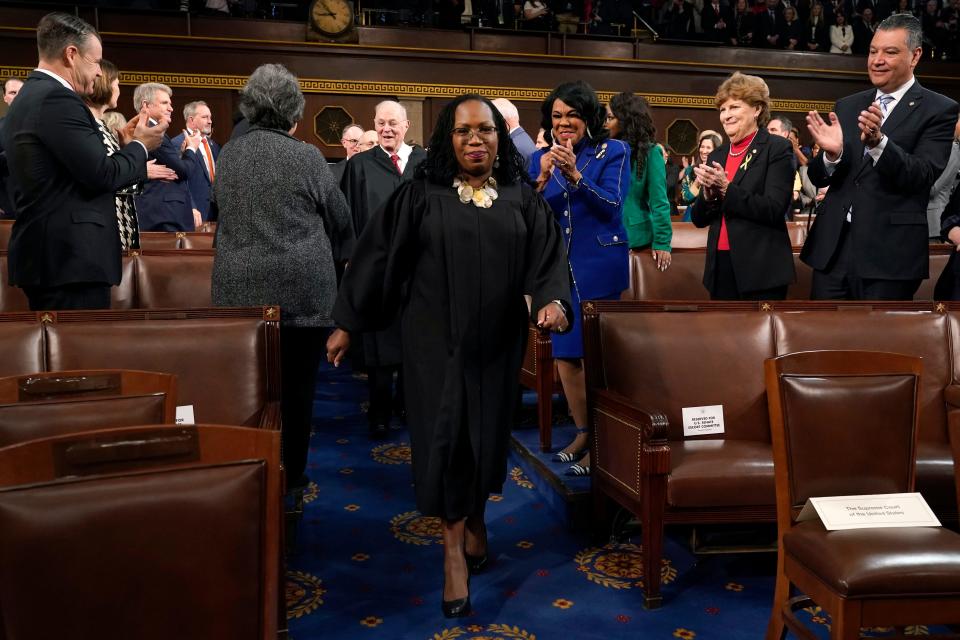What Justice Jackson's recusal from Harvard affirmative action case means for Black students
The Supreme Court will decide by June whether colleges can continue to use race as a factor in deciding which students to admit. Two separate cases are before the court, one involving Harvard, an elite private institution, and the University of North Carolina, a highly selective public university.
Experts say the outcome of the cases will have the greatest impact on Black and Latino students.
Justice Ketanji Brown Jackson, the only Black woman on the conservative-leaning court, said during her confirmation hearings last year that she’d recuse herself from participating in the case against Harvard. Jackson served on the board of overseers at Harvard, where she earned her bachelor’s and law degrees. In that role, she was not directly involved in the school’s admissions but did advise the university about its strategic priorities.
Affirmative action: Supreme Court signals skepticism of race-conscious college admissions
Although Jackson is participating in the North Carolina case, some advocates for affirmative action were disappointed about her absence from the Harvard case. “When justices are having their discussion, they won’t benefit from her experience,” said Michael Williams of the Coalition for a Diverse Harvard.
The other Black justice, Clarence Thomas, has opposed affirmative action, and the only Latina on the panel, Sonia Sotomayor, is in the liberal minority.
Brown v. Board: Supreme Court affirmative action cases spark heated debate over meaning of landmark case
Court's conservative supermajority may diminish Jackson's role
Jackson’s recusal won’t have an enormous influence given the court’s conservative supermajority, said Kimberly West-Faulcon, a professor of constitutional law at Loyola Marymount University in Los Angeles. The Supreme Court has “an immense amount of power and discretion,” she said.
During the sometimes heated arguments in one of the term's most-watched cases, several of the court's conservatives justices noted that a 2003 precedent that permits the use of race in admissions warned against indefinite use of these policies. The court's conservative justices asked how supporters of the race-conscious admissions would decide their goals had been reached.
"So what are you saying when you're up here in 2040? Are you still defending it?" Associate Justice Amy Coney Barrett asked. "Like this is just indefinite?"
Making an impression: Weeks into the job, Justice Ketanji Brown Jackson is already having a moment on the Supreme Court
In Students for Fair Admissions v. Harvard, the court is weighing whether the university’s race-conscious admissions policy violates the Civil Rights Act. Students for Fair Admissions v. University of North Carolina at Chapel Hill challenges the public university’s use of affirmative action as a violation of the 14th Amendment’s equal protection clause.
During the court’s arguments in October in the North Carolina case, Jackson questioned whether race-conscious admissions help African American and Latino applicants at the expense of Asian and white applicants because the system gives a boost to many different prospective students for reasons other than race.
“It seems from the race hypothetical that if there was only one basis for giving someone a boost, and that basis was race, then I see disadvantage, absolutely, to anyone else who’s not an underrepresented minority who can get that boost,” she said in oral arguments. “But I understood that we have here a program in which there are ... at least 40 different bases for being able to get a boost, and not everybody who is an underrepresented minority gets a boost. So, it’s really hard to figure out if anyone is being disadvantaged in a system like that.”
The Supreme Court is more diverse than ever: But the lawyers who argue before it? Mostly white men.

Who goes to college?
West-Faulcon, author of an article in the UCLA Law Review titled "Obscuring Asian Penalty with Illusions of Black Bonus," said that “while institutions do use race in a narrowly tailored way, there are not hordes and hordes of African American and Latino students being admitted to elite universities in this nation.”
Fifteen percent of Black students "attended a highly selective institution," and 8% of those students "attended an elite research institution" as of 2019, according to the Postsecondary National Policy Institute.
Wrong impression: Affirmative action critics paint Asian Americans as the ‘model minority.’ Why that's false.
In states that as of the end of 2022 had already banned race-based affirmative action admission policies at public universities – including Arizona, California and Michigan – many haven’t been able to recover from a decline in minority enrollment, said Anthony Lising Antonio, a professor at Stanford University researching equity issues in schools.
The National Center for Education Statistics shows that of the 15.9 million undergraduate students enrolled in fall 2020 across any higher education institution, 2 million were Black, a 21% decrease since 2009. White students also saw a decrease of 25%, while Hispanic students had enrollment gains of 42% and Asian student enrollment held steady.
Proponents of affirmative action argue that ending it will result in fewer students from diverse backgrounds on college campuses. Williams said eventually people will see fewer people of color in leadership and corporate roles.
How diverse is corporate America? There are more Black leaders but white men still run it
Contributing: John Fritze
Contact Kayla Jimenez at [email protected]. Follow her on Twitter at @kaylajjimenez.
This article originally appeared on USA TODAY: What Justice Jackson's recusal from affirmative action case means
